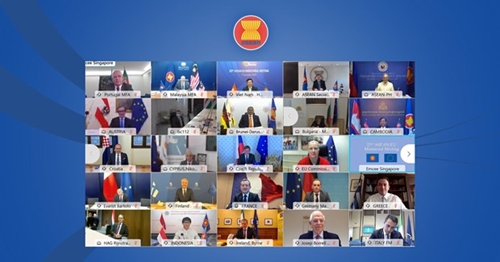The meeting was co-chaired by Singapore’s Minister for Foreign Affairs Vivian Balakrishnan, as Country Coordinator for ASEAN-EU Dialogue Relations, and EU High Representative for Foreign Affairs and Security Policy Josep Borrell. It was attended by the foreign ministers or representatives from all ASEAN member states and 27 EU member states, as well as the ASEAN Secretariat and European Commission (EC).
    |
 |
|
The Association of Southeast Asian Nations (ASEAN) and the European Union (EU) hold the 23rd ASEAN-EU Ministerial Meeting (AEMM) held on December 1 via videoconference. (Photo: asean.org) |
ASEAN and the EU reaffirmed the shared values and common interests that underpin 43 years of ASEAN-EU Dialogue Relations and noted with satisfaction the comprehensive and multifaceted nature of their dynamic partnership today. The two sides commended the good progress on the implementation of the ASEAN-EU Plan of Action (2018-2022).
Recognising the unprecedented impact of the COVID-19 pandemic, they encouraged greater cooperation in strengthening both regions’ preparedness for and capacity to respond to current and future public health crises in line with Sustainable Development Goal 3 on health and well-being.
The two sides recognised the EU’s early engagement with ASEAN at the outset of the pandemic through the successful convening of the ASEAN-EU Ministerial Video Conference on COVID-19 in March 2020.
They discussed ways to take forward cooperation to combat the novel coronavirus, facilitate robust recovery, and enhance their long-term resilience and sustainability, including through bilateral cooperation to support the implementation of the ASEAN Comprehensive Recovery Framework.
The EU and ASEAN agreed on the importance of collaboration at the WHO, including towards an impartial review of the pandemic response. The EU and ASEAN looked forward to continue working together on pandemic response and sustainable recovery efforts, in line with the ASEAN Comprehensive Recovery Framework.
They were heartened by their robust economic cooperation, with the EU being ASEAN’s third largest foreign investor and trading partner in 2019. They acknowledged the serious economic impact of the pandemic and resolved to strengthen the economic linkages binding the two regions to bolster the comprehensive post-pandemic economic recovery.
The two sides engaged in frank and fruitful discussions on regional and international issues of mutual interest and concern. Their ministers underlined the importance of the respect for the rule of law, sovereignty and territorial integrity of States, maritime security and safety, freedom of navigation and overflight, peaceful resolution of disputes, in accordance with the universally recognised principles of international law, including the 1982 United Nations Convention on the Law of the Sea (UNCLOS) and the relevant standards and recommended practices of the International Civil Aviation Organisation and the International Maritime Organisation.
They also reaffirmed their support for the open, inclusive and rules-based multilateral system and reiterated their shared interest in promoting international law and internationally agreed norms and standards.
They reiterated the importance of maintaining and promoting peace, security, stability, safety, and freedom of navigation in and overflight above the East Sea (internationally known as South China Sea) and the importance of non-militarisation and self-restraint in the conduct of all activities by claimants and all other states, including those mentioned in the 2002 Declaration on the Conduct of Parties in the East Sea (DOC) that could further complicate the situation and escalate tensions in the sea.
The ministers from both sides later congratulated Vietnam on its successful ASEAN Chairmanship 2020. The two blocs set to commemorate the 45th anniversary of their relations in 2022 and to continue their discussions at the 24th AEMM, scheduled to be hosted by the EU in the same year.
Speaking after the AEMM 23, German Foreign Minister Heiko Maas said that together ASEAN and the EU represent more than a billion people and one fourth of global economic power. “Together, we have a strong voice in this world,” Maas told the Germany-based newspaper FAZ.
Upgrading the ASEAN-EU relationship to a strategic partnership is a key goal of the Germany’s Presidency of the Council of the EU in the second half of this year, according to the German diplomat. EU countries look to diversify relations both in and with the Indo-Pacific, with ASEAN at its core.
Source: VNA